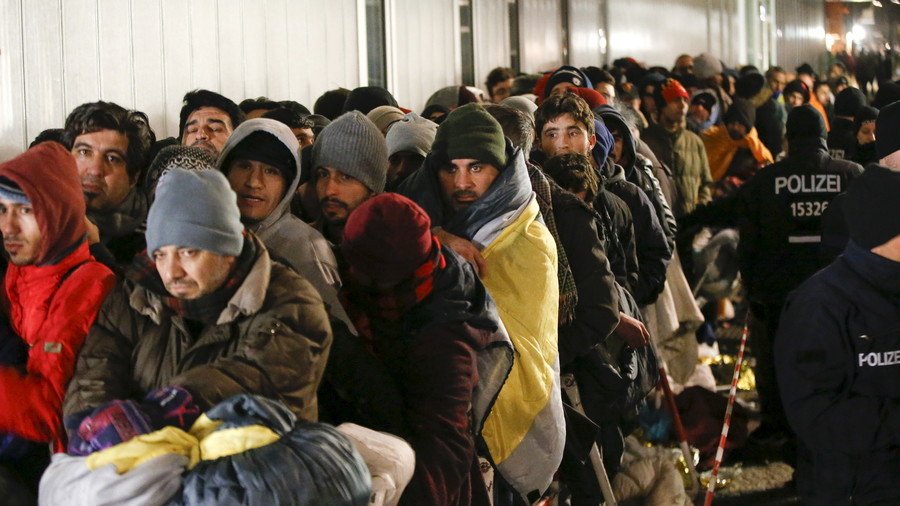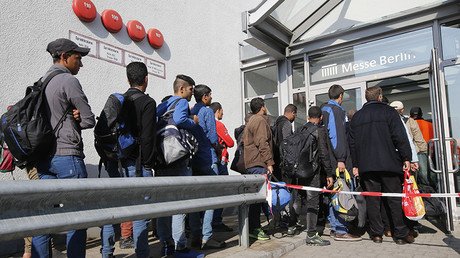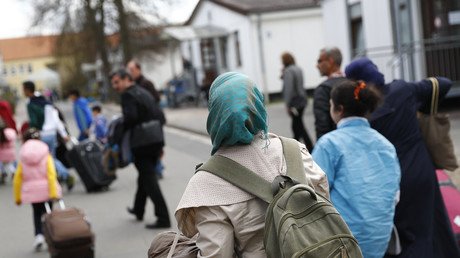Spate of violent offenses in Germany linked to inflow asylum seekers – study

The massive inflow of refugees into Germany has significantly contributed to the recent rise of violent crimes, a new study says. It adds that effective integration and more aid are needed to tackle the issue.
Germany has been recording a decrease in violent offenses for more than seven years before the refugee crisis, with the total number of such crimes falling by 22 percent over that period. The massive influx of asylum seekers, however, reversed this trend, leading to a renewed increase in violent criminal acts, the study conducted by a group of criminologists and forensic experts stated. The review was conducted at a request of the German Ministry of Family Affairs, Senior Citizens, Women and Youth.
The research, with a particular focus on the situation in the German north western state of Lower Saxony, shows that the number of violent crimes in the region rose by 10.4 percent between 2014 and 2016. It states further that 92.1 percent of all such cases investigated by police involves refugees and migrants.
The experts also point out that a disproportionally large number of such offenses are committed by those coming from North African countries while people fleeing the conflict zones of Syria, Iraq or Afghanistan are much less inclined to be involved in violent crimes. In 2016, North Africans, who constituted only 0.9 percent of all refugees registered in Lower Saxony, were responsible for 17.1 percent of violent crimes committed in the region.
North Africans committed 31 percent of robberies while Syrians, Iraqis and Afghans were involved only in 16 percent of such crimes, even though they account for more than a half of all asylum seekers in the region, Christian Pfeiffer, a former Justice Minister of Lower Saxony and an expert in criminology who co-authored the study, told the Bavarian radio broadcaster. He cautioned though, that their data might not provide a complete picture of the situation as people are most likely to report violent crimes committed by migrants twice as often as offences perpetrated by Germans.
The study also shows that one in three victims of violent crimes committed by migrants and refugees was another asylum seeker or “foreigner.” When it comes to murders, the percentage of migrants and refugees among victims hits 90 percent while in case of serious bodily assaults it amounts to three quarters.
Low chances for asylum & ‘lack of women’
The research team also identified a number of reasons contributing to the high migrant crime rates. Most refugees and migrants that come to Germany are young males aged between 14 to 30, and men of that age group “most inclined” to committing crimes “in any country of the world,” the study says. However, it also points out that such factors as the chances of getting asylum and the presence of a female partner or relative also play a major role.
Most Syrians, Afghans and Iraqis tend to stay away of any criminal activity as they are told that they have good chances of staying in Germany and being granted refugees status, Pfeiffer explained in interviews with Bavarian radio and the German broadcaster, ZDF. “They want by no means to ruin their chances by [doing] something thoughtlessly stupid,” the expert said. In sharp contrast when dealing with North Africans, “German authorities make it clear from the very onset: you cannot stay here, you all must go back [to your homelands,” he added.
Another problem lies in the fact that refugees and asylum seekers are mostly accommodated in overcrowded shelters, where young men have to spend their time in large groups consisting only of their male peers. Such situation leads to these men being increasingly “guided by the masculinity norms that legitimize violence,” the study found.
“Women have a civilizing influence,” Pfeiffer said, explaining that the study showed that male refugees who arrive in Germany with a family or at least a wife, a mother or a sister, are much more law-abiding. “The lack of women is having a negative impact everywhere,” he added, calling for enhancing the family reunification process.
He also advocated for new legislation that would set clear criteria for acquiring citizenship. “That would create a strong incentive for refugees and migrants to take effort to fulfil these citizenship criteria,” he told the German FAZ daily. He urged German authorities to step up integration efforts by providing refugees with sports facilities, language courses and internships.
Billion for repatriation program & more development aid
However, Pfeiffer said Germany cannot just grant all asylum seekers such a status just to reduce the number of crimes committed by failed asylum seekers. Instead, he called for a broader repatriation program. “It is not enough to say: send [them] away,” he said.
He particularly suggested providing money for the “re-integration” and support of returned asylum seekers in their home countries as well as giving more development aid to the migrants’ countries of origin, particularly North Africa. The expert said Germany should further support migrants who agree to voluntary return home.
“A large-scale program of voluntary repatriation could be expansive and [could] probably cost at least € 1 billion,” Pfeiffer told Bavarian radio. He added that Germany can still afford it as Berlin saved some €35 billion of tax money last year. “We have money that can be spent on security of our citizens,” he said.
The study's co-author, however, admitted that a repatriation program along with the development aid initiatives would only be effective if the EU restores full control over its external borders and is able to return rejected asylum seekers right at the border.
“It is too troublesome to let them all in and then bring them back to their homeland again via a repatriation procedure,” he told ZDF.
Pfeiffer told Bavarian Radio that out of 327,000 refugees whose asylum applications were rejected last year, some 200,000 appealed and are now awaiting a new verdict. At the same time, only 22,000 of failed asylum seekers were repatriated to their home countries over the same period.
Europe witnessed the worst refugee crisis since World War II, which saw a record number of refugees flooding into Europe from Syria, as well as other Middle Eastern countries and Africa in recent years, with the crisis reaching its peak in 2015.
Germany has been the most popular destination for new arrivals, and the country has allowed in more than one million asylum seekers since 2015, as the German Chancellor Angela Merkel introduced her so-called 'open-door' policy for those fleeing war and persecution.
Following the massive influx of asylum seekers, Germany witnessed a surge of offenses committed by refugees as well as of crimes targeting refugees and migrants. In April 2017, the German Interior Ministry said the number of migrant criminal suspects had increased by 50 percent over 2016. In the summer of 2017, German authorities also reported about the growing number of anti-Muslim incidents and increased activities of far-right groups.

















